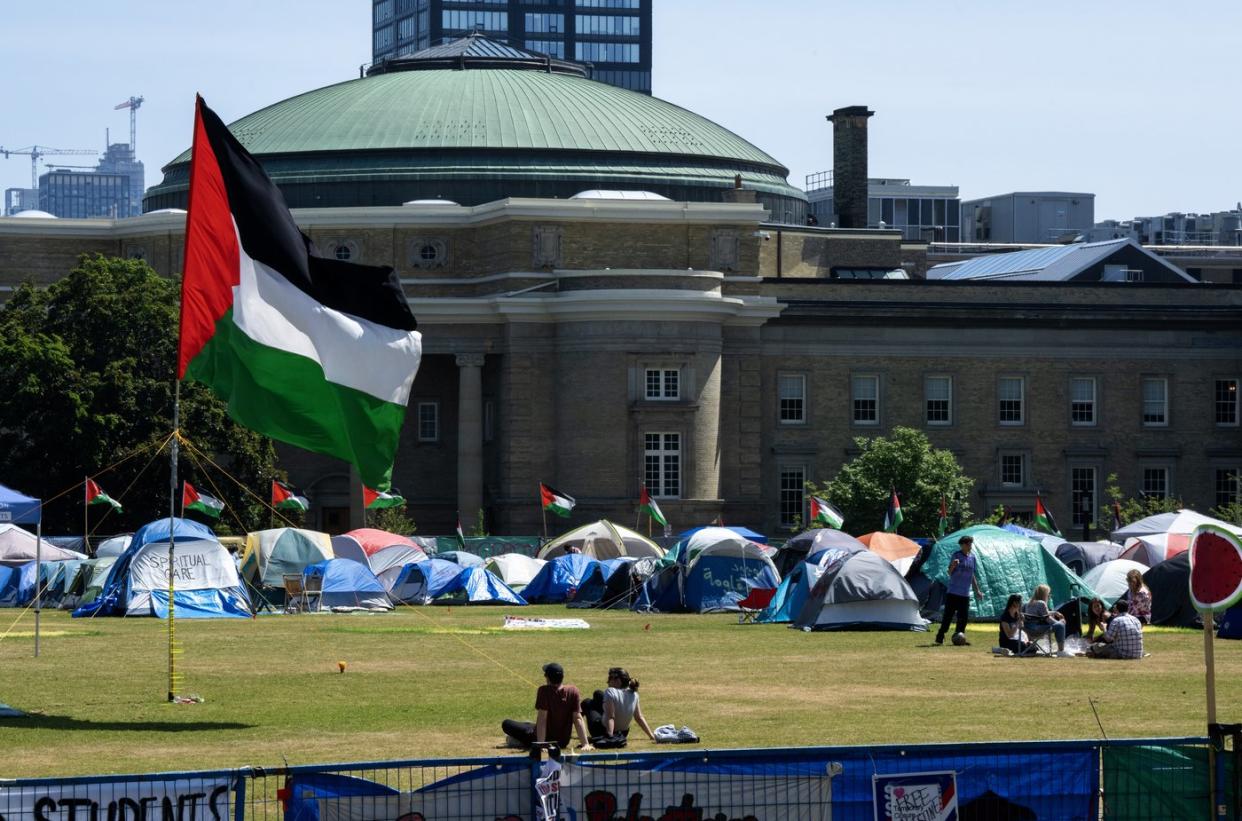University of Toronto graduation ceremonies set to begin with protest in background

TORONTO — Convocation ceremonies for graduating University of Toronto students begin Monday against the backdrop of a pro-Palestinian encampment that has remained on campus for weeks despite a trespass notice and looming legal action.
More than 30 ceremonies are scheduled to take place through June 21 and the university says all events will proceed as planned with "extra precautions."
The university sought to clear the encampment before convocation began with a request for an urgent court injunction authorizing police action to remove protesters who refuse to leave. But the judge considering the case said the earliest a hearing can be held is June 19 and 20, to give protesters a fair opportunity to respond.
That means most of the graduates and their family members attending ceremonies at the downtown campus will likely be passing by the fenced-in camp filled with tents, placards and flags. Convocation Hall faces King’s College Circle, where the encampment was set up on May 2 after protesting students breached a temporary fence the university erected around the large grassy area.
Among the exhibits and affidavits the university has filed in court so far are correspondence from students and family members who are concerned about the protest’s impact on convocation.
But protesters have said they don't see how their presence would disrupt graduation events. Sara Rasikh, an encampment spokesperson, said that fences have been present at King’s College Circle “for years” during convocations.
"The only difference this time compared to last year is that there are Palestinian flags on the fencing,” she said in an interview, adding that many students in the encampment are among those graduating this month.
“Folks graduating should attend (convocation) if they want to and we're not taking any public stance on that,” Rasikh said.
The university is arguing that the encampment poses health and safety risks and has led to numerous reports of harassment, hateful speech, antisemitic incidents and violence – claims denied by protest organizers.
In court filings, U of T says the increased number of students, faculty and others on campus during graduation ceremonies “creates the potential for continued verbal and physical harassment of community members by the occupants and increases the likelihood of potentially violent altercations to arise.”
Among emails submitted to the court, one student wrote to U of T to say they will not be attending their graduation dinner at the Hart House building because “campus is no longer a safe place for Jews.”
A concerned parent of a graduating student wrote to ask whether the convocation ceremony could be moved to "a safer location." The email said one of the family members planning to attend is a Holocaust survivor and walking by the encampment would be distressing.
"Please explain how U of T plans on ensuring a safe and meaningful graduation ceremony," the parent wrote.
"How does (the university) plan on ensuring the safety of all graduates and attendees? And how does (it) plan on ensuring no political disruptions to the ceremony? We are so proud of our daughter and simply want the celebration to be a celebration without any hiccups."
The University of Toronto said it takes the safety of graduating students and their guests “extremely seriously” and has a “well established” process to handle event disruptions.
"This year, we are taking extra precautions to ensure a safe and celebratory environment, including requiring graduating students to show identification when collecting their gowns and placing restrictions on bags and personal items brought into Convocation Hall,” it wrote in a statement to The Canadian Press.
The university's court filings also include some emails it received in support of the encampment, including a note from a student registered to graduate this month who urged administration to listen to the protesters' demands and avoid using police force to clear the camp.
"If a safe convocation cannot be ensured because of inadvertent effects of the protest, I would rather my convocation ceremony be cancelled than see other students arrested and brutalized," the student wrote.
Demonstrators have said they will stay in the encampment until the university meets their demands, which include disclosing investments in companies profiting from Israel's offensive in Gaza.
Similar encampments on university campuses have cropped up across Canada in recent months, with several schools considering or taking legal action against the protesters.
An encampment at McGill University has been in place for more than a month, forcing the administration to move graduation ceremonies off campus to the Bell Centre, home of the Montreal Canadiens.
McGill president Deep Saini expressed frustration that encampment representatives walked away from the last meeting aimed at ending their protest.
- with files from Rianna Lim
This report by The Canadian Press was first published June 2, 2024.
Sonja Puzic, The Canadian Press


